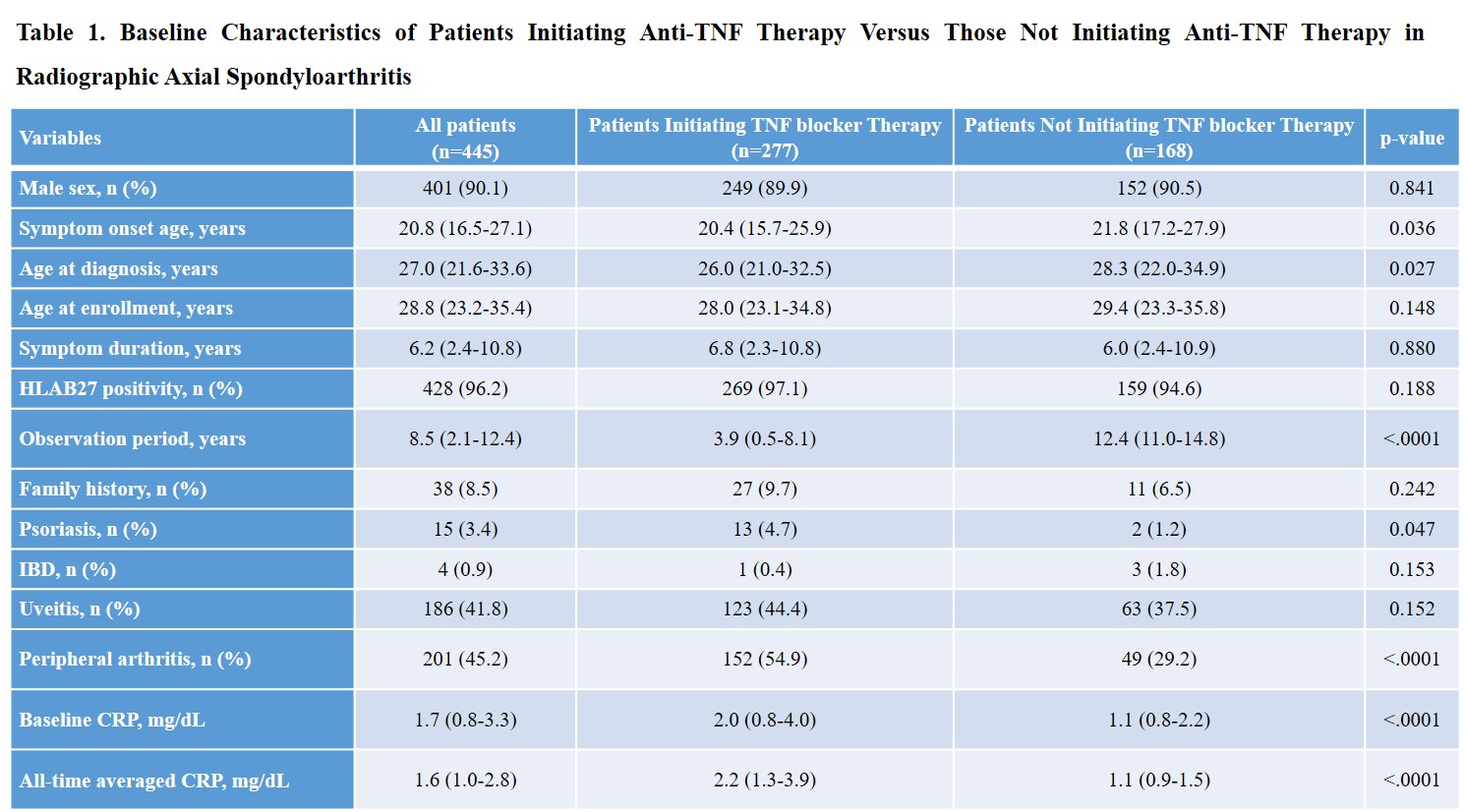Session Information
Date: Sunday, October 26, 2025
Session Type: Poster Session A
Session Time: 10:30AM-12:30PM
Background/Purpose: To identify clinical and genetic factors associated with the initiation of anti-TNF (tumor necrosis factor) therapy in patients with radiographic axial spondyloarthritis (r-axSpA) who respond poorly to NSAIDs (non-steroidal anti-inflammatory drugs).
Methods: A total of 445 Korean r-axSpA patients were enrolled and analyzed through genome-wide association studies (Table 1). The observation period started at the initial visit and continued until the initiation of anti-TNF therapy or the last follow-up, spanning 15 years. Multiple linear regression was utilized to identify clinical and genetic predictors of initiating anti-TNF therapy. Pathway analysis was also conducted.
Results: During 3658.8 person-years of observation, 277 patients initiated anti-TNF therapy. Clinical factors significantly associated with the initiation of anti-TNF therapy included younger age at symptom onset (β = -0.008, p = 3.91×10⁻⁵), presence of peripheral arthritis (β = 0.181, p = 1.39×10⁻⁷), and higher all-time averaged CRP levels (β = 0.022, p = 0.009). Additionally, several functional SNPs were nominally associated with anti-TNF therapy initiation. These included a synonymous variant in SNAP47 (rs117950953, p = 3.69×10⁻⁵), a missense variant in ANKRD24 (rs10413818, p = 8.47×10⁻⁵), and a variant in the 3′-UTR of CAV3 (rs7629329, p = 8.31×10⁻⁵), after adjusting for significant clinical factors (Table 2). Pathway analysis identified a significant association with the cell adhesion pathway (p = 7.96×10⁻⁵, Bonferroni-corrected p = 5.88×10⁻³).
Conclusion: This study highlights significant clinical and genetic factors associated with the initiation of anti-TNF therapy in r-axSpA patients with inadequate responses to NSAIDs, offering potential predictors for clinical application.
To cite this abstract in AMA style:
Kim T, Nam B, Bang S, Park Y, Shin J, Jo S, Kim T. Clinical and Genetic Factors Associated with Anti-TNF Therapy Initiation in Radiographic Axial Spondyloarthritis: A 15-Year Observational Study [abstract]. Arthritis Rheumatol. 2025; 77 (suppl 9). https://acrabstracts.org/abstract/clinical-and-genetic-factors-associated-with-anti-tnf-therapy-initiation-in-radiographic-axial-spondyloarthritis-a-15-year-observational-study/. Accessed .« Back to ACR Convergence 2025
ACR Meeting Abstracts - https://acrabstracts.org/abstract/clinical-and-genetic-factors-associated-with-anti-tnf-therapy-initiation-in-radiographic-axial-spondyloarthritis-a-15-year-observational-study/


.jpg)